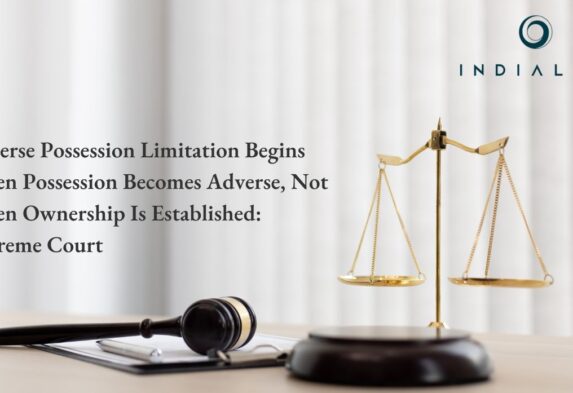Adverse Possession Limitation Begins When Possession Becomes Adverse, Not When Ownership Is Established: Supreme Court


In a recent judgment, the Hon’ble Supreme Court (“SC”) in the case of Neelam Gupta and Ors v. Rajendra Kumar Gupta and Anr.[i], categorically held that the period of limitation for establishing title by adverse possession begins from the date the defendant’s possession becomes adverse, rather than from the date the plaintiff obtains ownership rights.
Brief Facts of the Case:
The Respondent No.1, one Rajendra Kumar Gupta, had filed Civil Suit No. 195A/95 on 24th December, 1986, against Ashok Kumar Gupta and Rakesh Kumar Gupta for recovery of possession of 7.60 acres of property (Khasra No. 867/1) in Mowa village, claiming ownership based on a registered sale deed from 4th June, 1968, from their common cousin, Late Sitaram Gupta. He alleges he had peaceful possession until he was unlawfully dispossessed in July 1983. Gupta sought damages of Rs. 10,500/- and future damages at Rs. 1,000/- per acre, along with costs.
The original defendants filed a written statement on 4th April, 1990, asserting that their father, Sh. Ramesh Chandra Gupta, and the plaintiff’s father, Sh. Kailash Chandra Gupta, bought the disputed property in the name of their nephew, Late Sh. Sitaram Gupta, on 15th March, 1963. They also mentioned ownership of another 5-acre parcel in Khasra No. 924.
It was the case of the original defendants that their family’s bangle business, which began in Raipur in 1952 with ‘Laxmi Bangles Store,’ and expanded to Dhamtari in 1973. The defendants claimed an oral partition on 31st March, 1976, allocated the 5-acre land and the Dhamtari shop to the plaintiff’s family, while the suit property and the Raipur shop were assigned to them.
The contention of the original defendants was that the plaintiff was part of the Joint Hindu Family until the partition and raised defenses of adverse possession and limitation, claiming they had possessed the suit property for over 12 years. The original defendants acknowledged that following the plaintiff’s father’s death on 25th December, 1967, the property was transferred to the plaintiff in 1968 but maintained that possession remained with them. The original defendants emphasized that Ramesh Chandra Gupta and Kailash Chandra Gupta operated as joint family members in their business.
Proceedings Before the Ld. Trial Court:
In light of the conflicting pleadings, the Trial Court established 11 issues for examination. The Ld. Trial Court determined that the suit land was Joint Hindu Family property and examined whether the plaintiff acquired any rights through the sale deed dated 4th June, 1968. Per the observations made in the aforesaid issues framed, the Ld. Trial Court concluded that since the property was purchased in 1963 in Sitaram’s name using joint family income, it became joint family property. The Ld. Trial Court found no evidence that Sitaram was the head of the family, ruling that he lacked the authority to sell the property, rendering the deed void.
Additionally, the Ld. Trial Court upheld the defendants’ argument that the suit was barred by limitation, noting that the plaintiff was aware of the defendants’ adverse possession since 1968. Based on these findings, the Trial Court dismissed the suit. Dissatisfied with the Ld. Trial Court’s dismissal of his suit, the plaintiff challenged the judgment in Civil Appeal No. 17 A of 2002 before the Third Additional District Judge, Raipur. On 9th April, 2003, the First Appellate Court upheld the dismissal of the suit. However, after reviewing the evidence, it disagreed with the Ld. Trial Court’s conclusion that the suit property was Joint Hindu Family property.
Proceedings Before the Hon’ble High Court:
The Hon’ble High Court of Chhattisgarh (“HC”) referred to the Hon’ble Supreme Court’s decision in Indira v. Arumugam[ii] to establish that in a suit for possession based on title, once the plaintiff’s title is substantiated through relevant documents and evidence, the defendant must prove adverse possession for the statutory period to justify dismissal of the plaintiff’s claim. Citing Saroop Singh v. Banto[iii], the HC clarified that, per Article 65 of the Limitation Act[iv], the limitation period does not begin when the plaintiff’s ownership rights arise, but rather when the defendant’s possession becomes adverse.
It further determined that if the plaintiff can demonstrate title and possession of the suit property within twelve years prior to filing the suit, the burden shifts to the defendants to establish their title through adverse possession. Therefore, the limitation period under Article 65 starts from the point of the defendant’s adverse possession, not from when the plaintiff acquired ownership rights. Consequently, the HC set aside the concurrent judgments of dismissal by the Ld. Trial Court and Hon’ble First Appellate Court on the basis of limitation, providing these legal justifications.
Analysis by the Hon’ble Supreme Court:
The SC observed that while the Hon’ble First Appellate Court reversed the Ld. Trial Court’s finding regarding the suit land being Joint Hindu Family property, it did not thoroughly address or determine the validity of the Ld. Trial Court’s declaration that the sale deed was void. The Hon’ble First Appellate Court did not nullify that finding. The SC referenced Section 6(h) of the Transfer of Property Act[v], which states that no transfer can be made to someone legally disqualified from being a transferee. Section 7[vi] emphasizes that anyone competent to contract can transfer property as permitted by law. It noted that, according to Section 54[vii], an agreement to sell is a contract, but not all contracts of sale are deemed sales. Therefore, a minor can be a transferee but not a transferor of immovable property.
Additionally, the SC observed that, in this case, the cousin had no legal disqualification at the time of purchasing the suit land on 15th March, 1963, nor did the respondent have any issues as a transferee when the sale deed was executed on 4th June, 1968. Consequently, the sale deed was not void, and the respondent acquired ownership of the property based on the sale deed.
The SC relied upon the precedent laid down in, Brij Narayan Shukla (D) through LRs. v. Sudesh Kumar alias Suresh Kumar (D) through LRs. and Ors[viii]., in addressing whether tenants of the original owner could claim adverse possession against a transferee of the landlord, the Court ruled that tenants or lessees cannot assert adverse possession against their landlord or lessor. As their possession is inherently permissive, stemming from their tenancy agreement.
The SC, held that in the present case, the evidence provided by the defendants/appellants demonstrates that they did not establish the requisite ‘animus possidendi’ necessary for asserting hostile possession. Instead, their evidence indicated only permissive possession. Furthermore, they failed to prove when their possession transitioned to being adverse to the plaintiff’s title, and whether it was open and continuous for the required prescriptive period.
The HC concluded that the appellants did not meet the criteria necessary to establish adverse possession. It affirmed that the limitation period should be calculated from the date the respondent acquired ownership of the suit land, rather than focusing on whether the appellants had successfully pleaded and proven the start of their adverse possession. The HC’s intervention in this matter was deemed appropriate. Consequently, the SC upheld the HC’s well-reasoned decision in the contested judgment.
Authors’ Opinion:
In authors’ opinion, the judgment in the present dispute is pivotal for clarifying the principles of adverse possession within property law by establishing that the period of limitation begins only when a defendant’s possession becomes adverse. This distinction not only underscores the importance of the nature of possession but also helps ensure that claims are evaluated based on substantive evidence rather than procedural technicalities. Additionally, the ruling reinforcing the burden of proof on defendants to substantiate their claims of adverse possession.
[i] 2024 SCC OnLine SC 2824.
[ii] AIR 1999 SC 1549.
[iii] (2005) 8 SCC 330.
[iv] Article 65. For possession of immovable property or any interest therein based on title.
[v] Section 6(h). What may be transferred. (h) No transfer can be made (1) in so far as it opposed to the nature of the interest affected thereby, or] (2) 6[an unlawful object or consideration within the meaning of section 23 of the Indian Contract Act, 1872 (9 of 1872), or (3) to a person legally disqualified to be transferee.]
[vi] Section 7. Persons competent to transfer. Every person competent to contract and entitled to transferable property, or authorised to dispose of transferable property not his own, is competent to transfer such property either wholly or in part and either absolutely or conditionally, in the circumstances, to the extent and in the manner, allowed and prescribed by any law for the time being in force.
[vii] Section 54. “Sale” defined. “Sale” is a transfer of ownership in exchange for a price paid or promised or part-paid and part-promised.
Sale how made.-Such transfer, in the case of tangible immoveable property of the value of one hundred rupees and upwards, or in the case of a reversion or other intangible thing, can be made only by a registered instrument.
In the case of tangible immoveable property of a va lue less than one hundred rupees, such transfer may be made either by a registered instrument or by delivery of the property.
Delivery of tangible immoveable property takes place when the seller places the buyer, or such person as he directs, in possession of the property.
Contract for sale.- A contract for the sale of immoveable property is a contract that a sale of such property shall take place on terms settled between the parties.
It does not, of itself, create any interest in or charge on such property.
[viii] (2024) 2 SCC 590.




